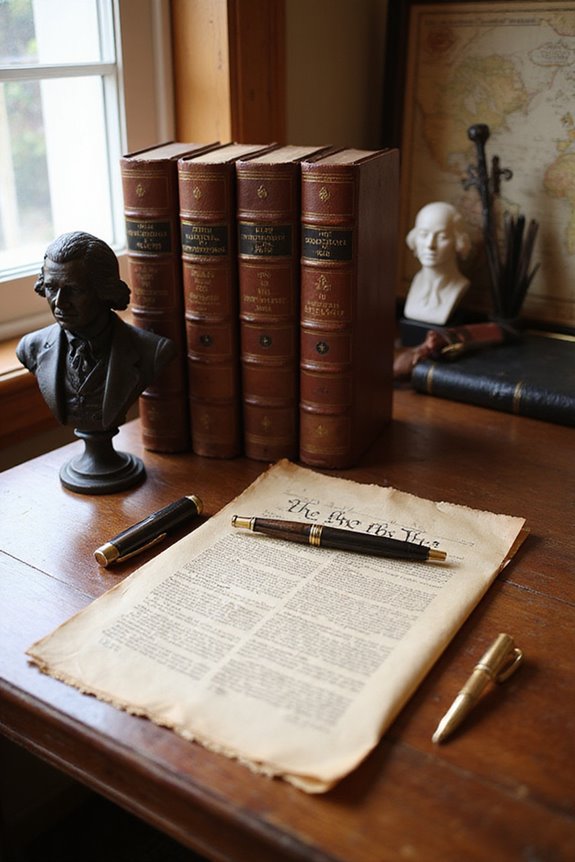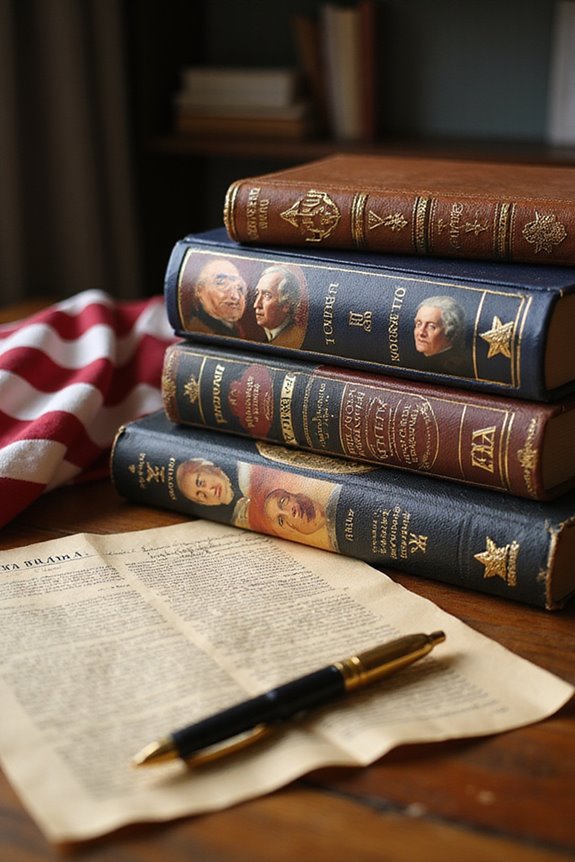Here are some excellent books about political leaders that provide insight into their lives and leadership styles:
- *A Promised Land* by Barack Obama highlights resilience in leadership challenges.
- *Long Walk to Freedom* by Nelson Mandela showcases moral leadership during apartheid.
- *Hard Choices* by Hillary Rodham Clinton emphasizes critical decisions in office.
- *Decision Points* by George W. Bush reveals presidential thought processes.
- Ron Chernow’s biography of Alexander Hamilton examines his influence on America’s economy.
Explore more to uncover additional remarkable titles.
Key Takeaways
- Barack Obama’s *A Promised Land* offers insights into resilience and leadership challenges faced during his presidency.
- Nelson Mandela’s *Long Walk to Freedom* highlights moral leadership and the fight against apartheid in South Africa.
- Hillary Rodham Clinton’s *Hard Choices* discusses pivotal decisions made during her tenure as Secretary of State.
- George W. Bush’s *Decision Points* reveals his thought processes during significant events in his presidency.
- Ron Chernow’s biography of Alexander Hamilton illustrates his foundational role in shaping the U.S. economy and government.
Historical Perspectives on Leadership
When we examine historical perspectives on leadership, it’s essential to recognize how various factors have shaped the way leaders operate. Importantly, James MacGregor Burns introduced *transformational leadership*, which emphasizes inspiring followers to pursue shared goals. This approach contrasts with *transactional leadership*, focusing on exchanges and rewards. Historical events, such as wars and crises, necessitated *adaptive strategies* among leaders like Abraham Lincoln, who adjusted their methods while remaining committed to core values. Additionally, cultural norms influence how leaders are perceived, affecting their effectiveness. By studying diverse historical contexts, we gain insights into effective leadership practices, especially when considering how geographical constraints can shape political decisions. These lessons remind us that adaptability and vision are vital for maneuvering complex challenges throughout history, especially in light of the ongoing challenges to democratic governance.
Insights From Contemporary Leaders

In today’s rapidly evolving landscape, contemporary leaders face numerous challenges that require them to be both adaptable and strategic.
- Leadership Adaptability: Leaders must quickly adjust to technological advancements and shifting market dynamics. Effective leadership facilitates communication and decision-making, ensuring that organizations can respond to these changes efficiently. FDR’s New Deal policies serve as a historical example of how adaptive leadership can effectively address economic crises.
- Ethical Leadership: In an increasingly polarized environment, emphasizing ethics and transparency is essential to rebuild trust among stakeholders.
- Collaboration: Effective collaboration fosters inclusive environments, enhancing team-oriented success.
- Mental Health Support: Prioritizing mental health initiatives improves employee performance and well-being.
- Sustainability: Integrating sustainability into core strategies balances short-term profits with long-term environmental responsibility.
Memoirs and Reflections of Political Figures

Political memoirs offer invaluable insights into the lives and leadership philosophies of influential figures, allowing us to understand their motivations and decision-making processes. These narratives often reflect personal journeys that shape their political ideologies.
- Barack Obama’s *A Promised Land* details his evolution from a young man to the presidency. This memoir emphasizes themes of resilience as Obama navigates the challenges of leadership and governance.
- Nelson Mandela’s *Long Walk to Freedom* chronicles his fight against apartheid, showcasing his resilience and moral leadership.
- Hillary Rodham Clinton’s *Hard Choices* examines her experiences as Secretary of State, highlighting critical leadership decisions.
- George W. Bush’s *Decision Points* focuses on key moments during his presidency, revealing his thought processes. Additionally, Joe Biden’s *Promise Me, Dad* reflects on the impact of his son’s death and the promise made to navigate grief and purpose in his life.
Through these memoirs, we gain valuable perspectives on the complexities of leadership and the personal experiences that define these political figures.
Biographies of Founding Figures

Examining the biographies of founding figures reveals the complexities and contributions that shaped the United States.
- Alexander Hamilton: Ron Chernow’s biography highlights Hamilton’s journey from poverty to statesman. His role in designing the U.S. economy, including the first national bank, showcases Hamilton’s legacy. Leadership lessons from Hamilton’s life are also essential for understanding the origins of American political thought. Additionally, Hamilton’s advocacy for a strong federal government laid the groundwork for modern governance.
- George Washington: Various biographies detail Washington’s leadership during the American Revolution. His ability to unify diverse groups was essential in establishing the U.S. government. Washington’s presidency also set important precedents that continue to influence the office today.
These works emphasize the debates between Hamilton and other figures like Jefferson, influencing the nation’s legal frameworks and governance. The Federalist Papers, co-authored by Hamilton, provided critical support for the Constitution. Together, these biographies offer insights into the foundational ideas that continue to shape American political discourse.
International Leaders and Their Impact

As global dynamics shift, the impact of international leaders becomes increasingly significant. These leaders shape global diplomacy and economic policies, influencing both regional and worldwide stability.
- Visionary Leadership: Xi Jinping’s long-term goals affect global trade and security.
- Strong Diplomacy: Narendra Modi enhances India’s stature through strategic alliances, holding the highest approval rating among global leaders in early 2025.
- Economic Focus: Emmanuel Macron’s policies aim to stabilize France’s economy.
- National Security: Vladimir Putin’s military strategies impact global perceptions of security.
- Social Reform: Claudia Sheinbaum’s initiatives target social equality in Mexico.
Through participation in global forums like the G20, these leaders encourage international cooperation, addressing pressing global challenges. Their leadership characteristics not only define their nations but also resonate throughout the international community, shaping our shared future.
Frequently Asked Questions
What Are the Best Biographies on Lesser-Known Political Figures?
When we explore hidden figures and untold stories, we find biographies that illuminate lesser-known political leaders. These narratives enrich our understanding, revealing their essential contributions and shaping narratives often overlooked in traditional histories.
How Do Political Leaders Influence Public Opinion Through Literature?
We believe political leaders wield significant literary influence, shaping public discourse through their writings. By framing narratives and emphasizing certain ideologies, they effectively guide public opinion, often amplifying elite perspectives while potentially sidelining broader societal views.
Are There Books on Female Political Leaders and Their Impact?
Yes, there’re many books showcasing female leadership and their impactful narratives. These stories inspire us, highlighting the unique contributions women make in politics, encouraging future generations to engage and challenge traditional norms in society.
What Role Do Political Novels Play in Shaping Leadership Perceptions?
Political novels are like fireworks for our leadership narratives, igniting our political imagination. They shape perceptions by humanizing leaders, challenging stereotypes, and encouraging us to reflect on societal values and the complexities of power.
How Can I Find Books on Global Political Movements and Their Leaders?
To find books on global movements and political ideologies, we can explore online archives, check platforms like Blinkist and Verso Books, and investigate scholarly works that analyze the intersection of activism and leadership.




